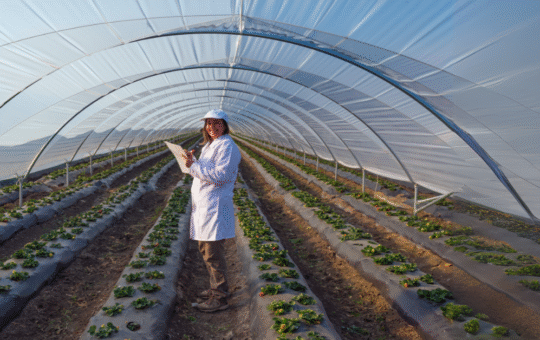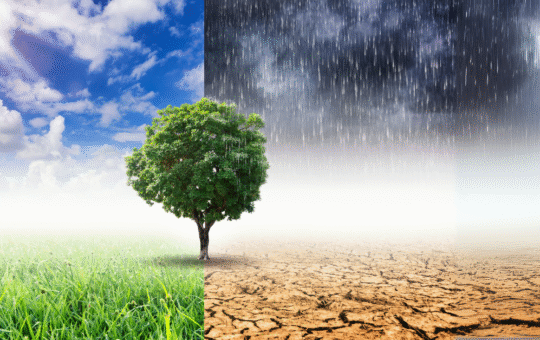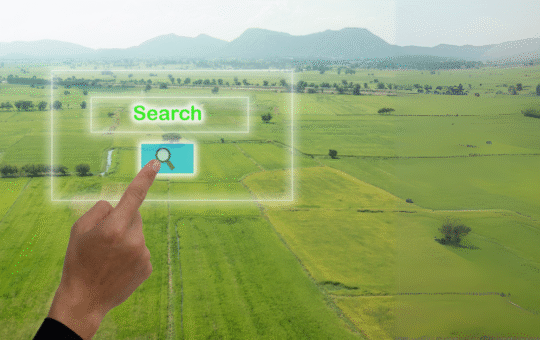
Level 4 Agricultural Climate Change Adaptation Strategies
- Climate Resilience: Learn how to assess climate risks and implement strategies to build resilience in agricultural systems.
- Sustainable Practices: Gain practical skills in sustainable farming techniques that mitigate the impacts of climate change on crops, livestock, and farming environments.
- Global Perspectives: Understand global climate change impacts on agriculture and how different regions and countries are adapting to changing conditions.
- Improved Food Security: Learn how to ensure food production continues in the face of climate change, promoting long-term food security.
- Career Advancement: Position yourself as an expert in the growing field of climate-smart agriculture, offering solutions to the world's most pressing agricultural challenges.
- Understand Climate Change Science: Gain an in-depth understanding of the science behind climate change and how it impacts agricultural systems, from temperature changes to rainfall patterns.
- Assess Climate Risks in Agriculture: Develop the skills to assess how climate change may affect crop yields, water availability, and farming practices in various agricultural systems.
- Adaptation Strategies for Crops: Implement adaptation strategies for crop production, such as drought-resistant varieties, crop diversification, and optimized irrigation systems.
- Adaptation Strategies for Livestock: Learn methods for adapting livestock farming to changing climates, including better breed selection, shelter, and feed management.
- Climate-Smart Agriculture Techniques: Gain knowledge of climate-smart practices, such as agroforestry, soil conservation, water management, and conservation tillage.
- Policy and Institutional Frameworks: Understand the role of government policies and institutional frameworks in supporting climate change adaptation in agriculture.
- Technology and Innovation: Learn about innovative technologies, such as weather forecasting tools, remote sensing, and data analytics, that support climate adaptation in agriculture.
- Sustainable Land and Water Management: Gain the skills to develop land and water management practices that are resilient to climate impacts and promote long-term agricultural sustainability.
- Introduction to Climate Change and Agriculture
- The science of climate change and its impact on agriculture.
- Climate models and predictions for agricultural sectors.
- Key challenges faced by farmers due to climate change.
- Climate Risk Assessment in Agriculture
- Assessing vulnerability to climate change in different agricultural contexts.
- Tools and techniques for climate risk assessment.
- Case studies on the impacts of climate change on different crops and livestock.
- Adaptation Strategies for Crop Production
- Development of climate-resilient crop varieties.
- Techniques for drought tolerance, heat tolerance, and pest resistance.
- Integrated pest management in the face of changing climate conditions.
- Adaptation Strategies for Livestock
- Managing livestock health and productivity under changing climates.
- Animal breed selection, nutrition, and shelter for climate resilience.
- Water and feed management strategies in climate-impacted areas.
- Climate-Smart Agricultural Practices
- Overview of climate-smart agriculture (CSA) principles.
- Water management, soil conservation, and agroforestry for climate adaptation.
- Sustainable farming practices for increasing agricultural productivity under climate stress.
- Innovations and Technology for Climate Adaptation
- The role of technology in climate adaptation, including climate forecasting tools.
- Use of remote sensing, drones, and satellite data for crop monitoring.
- Mobile applications and digital platforms for climate information dissemination.
- Policy, Governance, and Institutional Support
- Government policies and international frameworks on climate change and agriculture.
- Climate change adaptation strategies in agricultural policy and governance.
- Role of local institutions, NGOs, and international organizations in supporting adaptation efforts.
- Sustainable Land and Water Management
- Techniques for sustainable land use and water resource management under climate stress.
- Building integrated systems for water conservation and land restoration.
- Case studies of successful sustainable land and water management strategies.
- Climate Change Adaptation Specialist
- Sustainable Agriculture Consultant
- Environmental Manager
- Agricultural Extension Officer
- Agroecologist
- Climate Policy Analyst
- Water Resource Manager
- Researcher in Climate Resilient Agriculture
- Farm Manager with a Focus on Climate Resilience
- Cutting-Edge Curriculum: Study the latest advancements in climate change adaptation strategies specifically tailored to agriculture.
- Expert Faculty: Learn from instructors who are experienced in both agriculture and climate science, providing you with a well-rounded education.
- Real-World Applications: Engage with real-life case studies and field-based learning to understand the practical aspects of climate change adaptation.
- Flexible Learning Options: Study online or in person, with access to digital resources and support for flexible learning schedules.
- Networking Opportunities: Connect with industry professionals, policymakers, and other students to share ideas, insights, and strategies in climate-smart agriculture.
Study Units
- Introduction to Climate Change and Agriculture
- The science of climate change and its impact on agriculture.
- Climate models and predictions for agricultural sectors.
- Key challenges faced by farmers due to climate change.
- Climate Risk Assessment in Agriculture
- Assessing vulnerability to climate change in different agricultural contexts.
- Tools and techniques for climate risk assessment.
- Case studies on the impacts of climate change on different crops and livestock.
- Adaptation Strategies for Crop Production
- Development of climate-resilient crop varieties.
- Techniques for drought tolerance, heat tolerance, and pest resistance.
- Integrated pest management in the face of changing climate conditions.
- Adaptation Strategies for Livestock
- Managing livestock health and productivity under changing climates.
- Animal breed selection, nutrition, and shelter for climate resilience.
- Water and feed management strategies in climate-impacted areas.
- Climate-Smart Agricultural Practices
- Overview of climate-smart agriculture (CSA) principles.
- Water management, soil conservation, and agroforestry for climate adaptation.
- Sustainable farming practices for increasing agricultural productivity under climate stress.
- Innovations and Technology for Climate Adaptation
- The role of technology in climate adaptation, including climate forecasting tools.
- Use of remote sensing, drones, and satellite data for crop monitoring.
- Mobile applications and digital platforms for climate information dissemination.
- Policy, Governance, and Institutional Support
- Government policies and international frameworks on climate change and agriculture.
- Climate change adaptation strategies in agricultural policy and governance.
- Role of local institutions, NGOs, and international organizations in supporting adaptation efforts.
- Sustainable Land and Water Management
- Techniques for sustainable land use and water resource management under climate stress.
- Building integrated systems for water conservation and land restoration.
- Case studies of successful sustainable land and water management strategies.
Upon successful completion of the diploma, learners will be able to:
- Understand Climate Change Science: Gain an in-depth understanding of the science behind climate change and how it impacts agricultural systems, from temperature changes to rainfall patterns.
- Assess Climate Risks in Agriculture: Develop the skills to assess how climate change may affect crop yields, water availability, and farming practices in various agricultural systems.
- Adaptation Strategies for Crops: Implement adaptation strategies for crop production, such as drought-resistant varieties, crop diversification, and optimized irrigation systems.
- Adaptation Strategies for Livestock: Learn methods for adapting livestock farming to changing climates, including better breed selection, shelter, and feed management.
- Climate-Smart Agriculture Techniques: Gain knowledge of climate-smart practices, such as agroforestry, soil conservation, water management, and conservation tillage.
- Policy and Institutional Frameworks: Understand the role of government policies and institutional frameworks in supporting climate change adaptation in agriculture.
- Technology and Innovation: Learn about innovative technologies, such as weather forecasting tools, remote sensing, and data analytics, that support climate adaptation in agriculture.
- Sustainable Land and Water Management: Gain the skills to develop land and water management practices that are resilient to climate impacts and promote long-term agricultural sustainability.
The Level 4 Diploma in Agricultural Climate Change Adaptation Strategies is specifically tailored for individuals who are working in agriculture, environmental management, and climate change policy, or those who wish to transition into these fields. This course is ideal for:
Farmers and Agricultural Managers
Farmers and agribusiness professionals looking to understand how to adapt their practices to changing climatic conditions and ensure the sustainability of their farming systems.
Climate Change Adaptation Specialists
Professionals working in climate resilience or environmental sustainability who want to specialize in the agricultural sector, focusing on developing strategies that help farmers cope with climate-related challenges.
Agricultural Extension Officers and Consultants
Individuals in advisory roles who want to gain expertise in climate change adaptation strategies to support farmers and agricultural enterprises in adapting to climate impacts.
Environmental and Sustainability Managers
Managers in environmental organizations or corporations who wish to enhance their understanding of climate change impacts on agriculture and develop solutions for sustainable farming practices.
Agricultural Policy Makers and Analysts
Professionals involved in the development of agricultural policies who want to deepen their knowledge of climate adaptation strategies and how to integrate these into policy frameworks.
Water Resource and Land Management Specialists
Professionals working in water and land management who aim to develop systems and strategies to conserve resources and ensure agricultural productivity under climate stress.
Climate Scientists and Researchers
Researchers and scientists who want to understand how climate change is affecting agriculture and how to develop practical, on-the-ground adaptation strategies.
Development Practitioners and NGOs
Individuals working for development organizations and NGOs focused on agricultural sustainability and climate change adaptation in developing countries.
Students and Aspiring Professionals
Individuals with an interest in pursuing a career in climate-resilient agriculture, sustainable farming, or climate change adaptation.
Our assessment process is designed to ensure every learner achieves the required level of knowledge, skills, and understanding outlined in each course unit.
Purpose of Assessment
Assessment helps measure how well a learner has met the learning outcomes. It ensures consistency, quality, and fairness across all learners.
What Learners Need to Do
Learners must provide clear evidence that shows they have met all the learning outcomes and assessment criteria for each unit. This evidence can take different forms depending on the course and type of learning.
Types of Acceptable Evidence
Assignments, reports, or projects
Worksheets or written tasks
Portfolios of practical work
Answers to oral or written questions
Test or exam papers
Understanding the Structure
Learning outcomes explain what learners should know, understand, or be able to do.
Assessment criteria set the standard learners must meet to achieve each learning outcome.
Assessment Guidelines
All assessment must be authentic, current, and relevant to the unit.
Evidence must match each assessment criterion clearly.
Plagiarism or copied work is not accepted.
All learners must complete assessments within the given timelines.
Where applicable, assessments may be reviewed or verified by internal or external quality assurers.
Full learning outcomes and assessment criteria for each qualification are available from page 8 of the course handbook.
Top Courses
No results found.
Related Courses
Let's Get in touch
Deleting Course Review
Course Access
This course is password protected. To access it please enter your password below:



